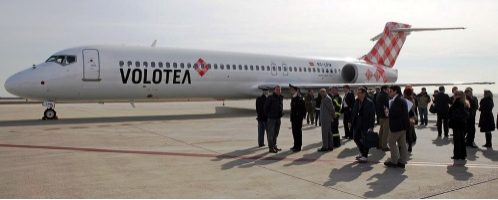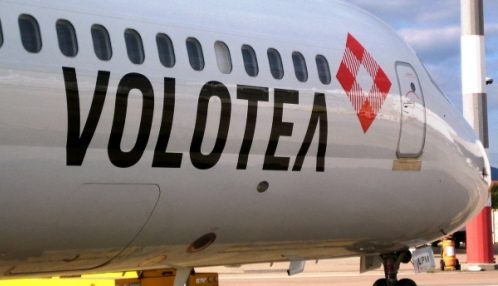Spanish start-up carrier Volotea has revealed that its main focus of operations will initially be in the Italian market with a base at Venice’s Marco Polo Airport being supported by operations from Palermo. The carrier aims to provide low-cost flights between some of Europe’s smaller and mid-sizes cities opening many new routes that are currently on served via a one-stop hub airport connection.
 Volotea will base three Boeing 717-200s in Venice to initially serve 14 destinations, rising to 24 during the peak summer periods as a fourth jet arrives. These include a mix of domestic and international destinations and although many of these are not currently served by any competitor, it will place the start-up in a direct rivalry with Alitalia on some of the internal services although these are mainly seasonal routes for the Italian flag carrier.
Volotea will base three Boeing 717-200s in Venice to initially serve 14 destinations, rising to 24 during the peak summer periods as a fourth jet arrives. These include a mix of domestic and international destinations and although many of these are not currently served by any competitor, it will place the start-up in a direct rivalry with Alitalia on some of the internal services although these are mainly seasonal routes for the Italian flag carrier.
The airline will launch operations from April 5, 2012 and its initial network will include the domestic cities of Brindisi, Cagliari, Olbia, Palermo, and Reggio Calabria) and international links to Alicante, Bilbao, Bordeaux, Budapest, Krakow, Malaga, Porto, Thessaloniki, and Santiago de Compostela. Its schedule will initially cover 90 flights a week but this will almost double to 160 a week in August 2012 when the available seats will increase from 11,250 to 20,000.
The market at Venice Marco Polo is quite spread and on none airline has a dominant position there, a good opportunity for Volotea to position itself in the market. UK low-cost carrier easyJet has the largest share of capacity with a 15.1 per cent share of the over 75,000 weekly seats available this month. The other major operators at Venice’s Maroc Polo Airport are Alitalia (14.8 per cent of capacity), Lufthansa (12.1 per cent) and Air France (9.5 per cent).
The table below show Volotea’s planned launch network and the routes it will face competition. There airline already has plans to increase the frequency on a number of these routes over the coming months and could ramp these up earlier as well as boosting capacity on other routes, subject to initial booking rates.
|
VOLOTEA’S LAUNCH NETWORK FROM VENICE MARCO POLO AIRPORT (non-stop weekly flights) |
||||
|
Destination |
Launch Date |
Weekly Flights |
Competition |
Notes |
|
Brindisi |
April 5 |
Three |
Alitalia |
|
|
Cagliari |
April 5 |
Three |
Alitalia |
Will increase to five a week from April 23 and to daily from June 25. |
|
Olbia |
April 06 |
Three |
Alitalia, Meridianafly |
Will increase to four a week from May 28, five weekly from June 4 and to daily from June 23. |
|
Palermo |
April 5 |
Daily |
Alitalia |
|
|
Reggio di Calabria |
April 06 |
Three |
Alitalia |
|
|
Alicante |
April 24 |
Two |
- |
Will increase to three a week from June 26. |
|
Bilbao |
April 25 |
Three |
Vueling (from June 28) |
|
|
Bordeaux |
April 25 |
Three |
- |
|
|
Budapest |
April 25 |
Three |
||
|
Krakow |
April 25 |
Two |
- |
|
|
Malaga |
April 27 |
Two |
- |
Will increase to three a week from June 18. |
|
Porto |
April 24 |
Two |
- |
Will increase to three a week from June 26. |
|
Santiago de Compostela |
April 25 |
Two |
- |
|
|
Thessaloniki |
April 24 |
Three |
- |
|
Alongside the direct rivalry, Volotea will also face indirect competition from Ryanair from Venice Treviso. The Irish budget carrier currently serves 19 destinations from the airport including links to Brindisi, Cagliari, Palermo in the domestic market. It will also launch flights to Budapest this year and will offer a seasonal link to Malaga too.
Volotea’s initial operations will not be limited to the city of Venice and the carrier will also offer a small network of seven weekly domestic flights from Palermo Punta Raisi. The start-up will initially offer a three times weekly flight to Genoa from April 6, 2012 although twice weekly connections to Ancona and Trieste will follow from the start of June.
Volotea says it will focus on “point-to-point services between Europe's small and mid-sized cities” which are either “subject to high fares” or “do not have direct flights” between them. It says it will achieve a sustainable business by ensuring it avoids “overlapping with routes operated by other low-cost carriers”. The airline also claims it stands as an “alternative to connecting flights”, as well as costly and time-consuming overland journeys, either by rail or road.
 “An efficient cost structure, based on the low-cost model and a very efficient type of aircraft, as well as an optimized route map will allow Volotea to offer very competitive prices in markets where low fares are currently non-existent,” it claims. “In those routes where a direct service does exist, Volotea will slash current fares by 50 per cent.”
“An efficient cost structure, based on the low-cost model and a very efficient type of aircraft, as well as an optimized route map will allow Volotea to offer very competitive prices in markets where low fares are currently non-existent,” it claims. “In those routes where a direct service does exist, Volotea will slash current fares by 50 per cent.”
Venice is likely to be the first of many bases across Europe and the start-up confirms that it will follow a similar business philosophy at other airports across the Continent. It confirms that it has “already been approached” by representatives of airports and tourism bodies at other cities to establish operations.
Volotea has been formed by Carlos Muñoz and Lázaro Ros, who were the original founders of Vueling Airlines, one of the most successful low-cost start-ups in Mainland Europe. The venture is also backed by three private equity firms which have committed funding for the airline’s launch. These comprise Axis Participaciones Empresariales, a wholly-owned subsidiary of Spain's Instituto de Crédito Oficial; Sinaer Inversiones, an aviation-investment vehicle partly owned by Corpfin Capital, an independent private equity firm which focuses on Spanish growth companies and CCMP Capital Advisors, a leading private equity firm specializing in upper-middle market buyouts and growth equity investments in the US and Europe.
"Amid this crisis, Volotea's birth is the consequence of a solid industrial, commercial and financial project, a project that seeks to make profitable a segment of the market not currently served by the existing airlines: direct links between small and mid-sized cities, bypassing hubs,” said Carlos Muñoz, founder and Chief Executive, Volotea.





